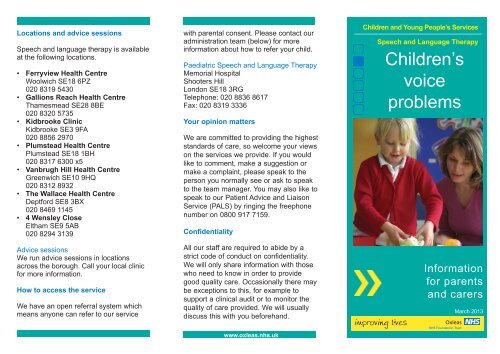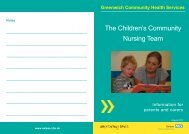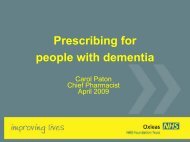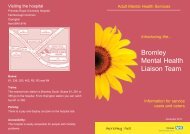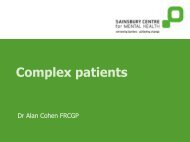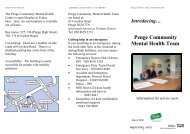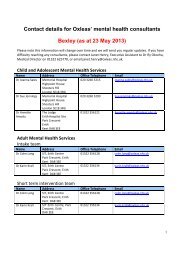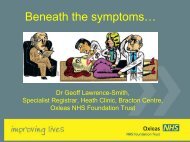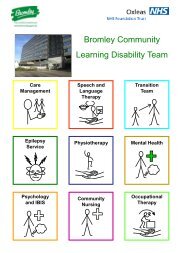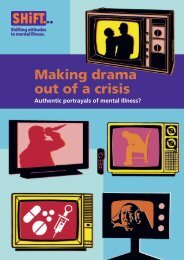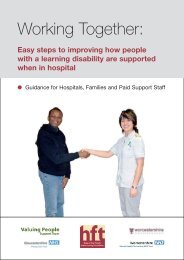Create successful ePaper yourself
Turn your PDF publications into a flip-book with our unique Google optimized e-Paper software.
Locations and advice sessions<br />
Speech and language therapy is available<br />
at the following locations.<br />
• Ferryview Health Centre<br />
Woolwich SE18 6PZ<br />
020 8319 5430<br />
• Gallions Reach Health Centre<br />
Thamesmead SE28 8BE<br />
020 8320 5735<br />
• Kidbrooke Clinic<br />
Kidbrooke SE3 9FA<br />
020 8856 2970<br />
• Plumstead Health Centre<br />
Plumstead SE18 1BH<br />
020 8317 6300 x5<br />
• Vanbrugh Hill Health Centre<br />
Greenwich SE10 9HQ<br />
020 8312 8932<br />
• The Wallace Health Centre<br />
Deptford SE8 3BX<br />
020 8469 1145<br />
• 4 Wensley Close<br />
Eltham SE9 5AB<br />
020 8294 3139<br />
Advice sessions<br />
We run advice sessions in locations<br />
across the borough. Call your local clinic<br />
for more information.<br />
How to access the service<br />
We have an open referral system which<br />
means anyone can refer to our service<br />
with parental consent. Please contact our<br />
administration team (below) for more<br />
information about how to refer your child.<br />
Paediatric Speech and Language Therapy<br />
Memorial Hospital<br />
Shooters Hill<br />
London SE18 3RG<br />
Telephone: 020 8836 8617<br />
Fax: 020 8319 3336<br />
Your opinion matters<br />
We are committed to providing the highest<br />
standards of care, so welcome your views<br />
on the services we provide. If you would<br />
like to comment, make a suggestion or<br />
make a complaint, please speak to the<br />
person you normally see or ask to speak<br />
to the team manager. You may also like to<br />
speak to our Patient Advice and Liaison<br />
Service (PALS) by ringing the freephone<br />
number on 0800 917 7159.<br />
Confidentiality<br />
All our staff are required to abide by a<br />
strict code of conduct on confidentiality.<br />
We will only share information with those<br />
who need to know in order to provide<br />
good quality care. Occasionally there may<br />
be exceptions to this, for example to<br />
support a clinical audit or to monitor the<br />
quality of care provided. We will usually<br />
discuss this with you beforehand.<br />
Children and Young People’s Services<br />
Speech and Language Therapy<br />
Children’s<br />
<strong>voice</strong><br />
<strong>problems</strong><br />
Information<br />
for parents<br />
and carers<br />
March 2013<br />
www.oxleas.nhs.uk
What is a <strong>voice</strong> problem<br />
Although your child may not complain of a<br />
sore throat, their <strong>voice</strong> may sound hoarse,<br />
croaky or strained.<br />
Some children have very little <strong>voice</strong> when<br />
they wake up; others find their <strong>voice</strong><br />
deteriorates during the day.<br />
Children can have unusually high or low<br />
<strong>voice</strong>s, or they may have difficulty<br />
controlling the volume of their speech.<br />
What causes a <strong>voice</strong> problem<br />
There are many possible causes or<br />
contributory factors that may affect your<br />
child’s <strong>voice</strong> including:<br />
• Repeated upper respiratory tract<br />
infections, eg laryngitis<br />
• Misuse of the <strong>voice</strong> by shouting and<br />
screaming<br />
• Hearing difficulties<br />
• Asthma and allergies, eg hayfever or<br />
dust mite allergy<br />
• Persistent coughing or throat clearing<br />
• Being highly strung or excitable<br />
• A change in their home or school<br />
environment which may have upset<br />
them – this may not seem obviously<br />
upsetting to an adult.<br />
What can be done to help a <strong>voice</strong><br />
problem<br />
Whatever the cause of a <strong>voice</strong> problem in<br />
a child, the involvement of a speech and<br />
language therapist will be necessary.<br />
Children may be referred to their local<br />
hospital’s Ear, Nose and Throat<br />
department. The doctor will want to check<br />
how the <strong>voice</strong> is working and may want to<br />
look down your child’s throat.<br />
The speech and language therapist will<br />
want to know where and how your child<br />
uses their <strong>voice</strong> and will discuss ways that<br />
you can help your child. This may include<br />
a programme of <strong>voice</strong> care for home and<br />
school, parent-child-interaction therapy or<br />
small group work.<br />
Tips for a healthy <strong>voice</strong> - how can you<br />
help<br />
• Make sure your child drinks plenty of<br />
water during the day - fruit juices and<br />
caffeine-based drinks can dry out the<br />
throat and vocal folds.<br />
• Discourage excessive shouting and<br />
screaming, particularly if your child<br />
complains of discomfort.<br />
• Provide regular opportunities for your<br />
child to ‘rest’ their <strong>voice</strong>, eg quiet play,<br />
particularly if they have been overusing<br />
it.<br />
• Avoid smoky environments.<br />
• Avoid sleeping in a hot, centrally<br />
heated room as this can dry out the<br />
vocal folds making the <strong>voice</strong> sound<br />
hoarse in the morning.<br />
• Keep background noise to a minimum<br />
to avoid shouting.<br />
• Encourage quiet talking rather than<br />
whispering.<br />
Other useful information<br />
www.talkingpoint.org.uk offers plenty of<br />
useful information about speech,<br />
language and communication<br />
development.


